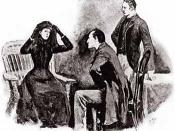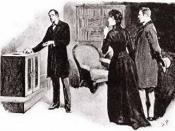Conan Doyle's 'The Speckled Band' Compared With 'Visitors' by Brian Moon This essay will examine both 'the Speckled Band' by Conan Doyle and 'Visitors' by Brian Moon and will look at how each one conforms to or diverges from the conventions of the detective story and also how each story is representative of the century it was written in by how it presents the woman, the hero and the villain.
The conventions of the detective story were mostly established in the early twentieth century yet 'the Speckled Band' was written in the late nineteenth century. However, it still conforms to most of the detective story conventions, therefore I conclude that it deserves to be called a detective story One of the conventions of the detective story is that the detective if frequently an amateur. In 'the Speckled Band' Holmes does not work for any official body, like the police, for example.
He is not, however, an amateur in the sense that he solves crimes for a hobby, he says, "as to my reward, my profession is my reward." Holmes is an amateur in the root sense of the word "someone who works simply for the love of it" However the way that Holmes uses the word "profession" shows that he does not consider himself to be an amateur.
Another convention of the detective story is that the detective will have a confidant through whom he can explain his reasoning to the reader. Holmes has a confidant, Watson, who is the stereotypical gentle doctor who is plain and uninteresting so as not to draw attention away from Holmes. "I had no keener pleasure than in following Holmes in his professional investigations" this implies that Watson lead an uninteresting life, without many interesting hobbies or pastimes.
Another convention of the detective story is that the detective is in competition with the police, however, in 'the Speckled Band' Holmes is not in competition with the police. Holmes does, however, express his disgust with the official police force " fancy his having the insolence to confound me with the official detective force" this line shows that Holmes considers the police force to be incompetent and ineffective.
A convention of the detective story is that it has a variety of suspects for the detective to choose between, 'the Speckled Band', however, does not have many suspects, only Dr Roylott and the gypsies. Roylott is a suspect for the murder as he is violent "uncontrollable in his anger" and the local people fear him "folks would fly at his approach". The gypsies are suspect because of the circumstantial evidence of Julia's use of the words "speckled band" this can be shown by "The spotted handkerchiefs which so many of [the gypsies] wear over their heads may explain the strange adjective that she used" It was this circumstantial evidence that made Holmes believe that the gypsies were to blame "Whistles at night [and] the presence of a band of gypsies who are on intimate terms with this old doctor⦠the mystery may be cleared along these lines" Holmes later admits to Watson that he was miss lead by this false evidence "the presence of the gypsies and the use of the word 'band'⦠was sufficient to put me on an entirely wrong scent" 'Visitors' conforms to some of the detective story conventions but in different ways to 'the Speckled Band', and in many ways diverges from these conventions.
One of the conventions of the detective story is that the detective is an amateur, or at least not a member of the "official detective force", however, in 'Visitors' the roles of the burglar and the police are switched round so the burglars are "professional [and]⦠respectable" whereas the police are "dirty and unkempt". In the story burglary has been nationalised and has become a profession while the police force seems to consist of all the amateurs that used to be the burglars before burglary was nationalised.
In 'Visitors' it is the burglar that is most like Holmes, being "respectable" and "professional" and if you consider him to be the detective figure then he does have a confidante; Mrs Morrison. I believe that she is a confidante because of the way the burglar explains his actions to her, like how Holmes does to Watson, for example "we've disconnected your phone at the junction", "we know that your daughter is at work" and also "nationalising robbery was the best thing the government could do in the circumstances." These show that the author used Mrs Morrison as a way of including a dénouement to explain the situation to the reader.
In 'Visitors' the burglars, whom I am assuming to be most like the detective in a standard detective story, do not seem to be in competition with the police, even though they would be today, because of the nationalisation of robbery which the burglar describes as "the best thing the government could do". I believe that the fact that the police know exactly when to arrive so as to miss the burglars yet still know what has happened "police, Mrs Morrison. Understand you've been robbedâ¦" shows that the police work alongside the burglars, not in competition.
'Visitors' does not comply to the convention of having a variety of suspects as there are not any suspects in 'Visitors'. I think there are no suspects as we know exactly who did the crime as they talk us through it themselves "will you accompany me on the inspection" Since 'The Speckled Band' is a nineteenth century story and 'Visitors' is a twentieth century story and society has changed considerably over the last century we would expect both stories to depict a completely different society.
In both stories it is a woman against whom the crime is committed and in this way both are the victim, however both behave in different ways.
In 'The Speckled Band' Miss Stoner is afraid and goes to Holmes for help. This shows that in the nineteenth century women were seen as weaker, needing the protection of a man, in this way 'The Speckled Band' conforms to a much older convention, that of a 'damsel in distress' dating from the middle ages. We see this again in 'The Speckled Band' Miss Stoner protects her stepfather even though he mistreats her "last week he hurled the local blacksmith over a parapet into a stream and it was only by paying over all the money I could gather together that I was able to avert another public exposure" In 'Visitors' the woman (Mrs Morrison) is portrayed as being far more independent and less reliant on men " "even so," she replied. "I think we'd be better off without"" This shows that she was willing to criticize the dominant man, even if not very strongly. However, she is still more helpless than Miss Stoner as there is no 'hero' figure to help her.
Both stories portray a hero and a criminal, the difference is that in 'The Speckled Band' they are different people while in 'Visitors' they are arguably the same person. In 'Visitors' the police are expected to act the heroic role but don't look or sound the part, in this way 'Visitors' appears not only to fail to comply with the conventions but also to be a paradoxical story.
My essay has shown that both stories conform to a certain extent to the conventions of the detective story. Both show views of the woman, hero and villain, and in 'The Speckled Band' this highlights the complacent, satisfied attitude of the Victorians, while 'Visitors' shows the less complacent, worried, changing attitude of the late twentieth century, influenced by the social devastation of two world wars.
After looking at 'Visitors' and 'The Speckled Band' I have come to the conclusion that 'Visitors' does not really deserve to be called a detective story as it does not really have a detective in it or even a crime to solve, however I still think that 'Visitors' is an exceptional story in its own right and a better story than 'The Speckled Band' because of how the important issues it brings up are dealt with.


